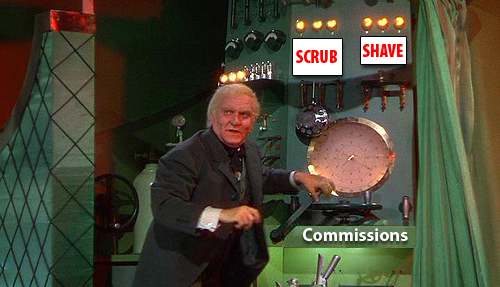If you have been around CPA industry forums for any time at all you will have come across multiple posts about “scrubbing” and “shaving”. Invariably the person is posting about their experience of being, ehemm…cheated by a network.
Most of the time the person posting the message has no truly statistically significant stats or evidence to back up their position, or if they do, almost always blame the network for a sudden decrease in conversion or the like.
Once and for all let’s clear the air a bit and get to the bottom of this alleged industry wide conspiracy to steal the commissions of these “honest” and “hard working” affiliates.
Most of the time that I see affiliates talking about getting scrubbed and shaved they never seem to use the correct terminology and rarely, if ever, understand what is truly going on behind the scenes.
So what’s going on behind the scenes at the networks? If you listen to the forums, it seems like the Evil Wizard of Oz is behind the curtain, yanking on the “steal commissions” lever. Is this what is really going on?Scrubbing – use of this term should really be reserved for when an advertiser or a network in real-time or post-processing decides to not pay a commission for a specific lead. There can be many reasons for this such as: it’s a duplicate, the credit card was stolen, the information provided was inaccurate, etc.
Any advertiser worth their salt should have most of these scrub reasons setup real-time with their forms. IE, you shouldn’t be getting a report at the end of the month screaming duplicates. They can check this real-time and should, although some don’t.
Scrubbing can be a valid practice assuming the advertiser and network are very clear with the affiliates up front about when they will and when they won’t pay on a conversion.
Shaving – use of the term shaving should be reserved for the more sinister of the actions. Shaving occurs when an advertiser gets a conversion, but doesn’t give the affiliate credit. Or, possibly, by a network that doesn’t give the affiliate a conversion when there clearly was one.
True shaving is never a valid practice and should not be tolerated.
Who is more likely the culprit here?
Let’s first assume that the affiliate actually has statistically significant stats or real evidence something strange is going on.
Although networks most often get blamed for this problem, in actuality, over 90% of the cases that involve shaving, it’s the advertiser doing the shaving. The advertiser has more to gain and less to lose by shaving. It’s really a very basic cheat to implement for an advertiser as well.
The advertiser simply places all conversion pixels in a snippet of code for which the advertiser can assign a “firing percentage”. In other words, I can define to only fire your affiliate conversion pixel 8 out of 10 times. Thereby effectively getting two free conversions and boosting my margins.
Unfortunately this is a VERY common practice among advertisers. There are a number of reasons for this, most of which fall back to greed. Some advertisers even attempt to justify shaving for specific affiliates based on things like lead quality and profit per lead from that individual affiliate.
Regardless of the reason, hidden and unannounced shaving is not an ethical practice, but it’s one you have to deal with unfortunately.
What Can You Do About It?
The first thing you need to do is stop immediately blaming the networks. As I said, an advertiser has more to gain by being shady with commissions than a network does.
Assuming you have statistically significant evidence of foul play, approach the network with your stats. Don’t point fingers and be unprofessional. Simply send them a detailed email and explanation of what you are seeing and would like to see what could be causing it.
If done right, sometimes the network will call out an advertiser or sometimes even find a “technical problem” that can be fixed.
Another thing this knowledge should arm you with is the fact that you never know what may be going on behind the scenes of an offer. What does that mean for you?
Well, it should be a lesson to not judge a book by its cover. Don’t assume that because one offer SHOULD perform better because of landing page qualities that it will. Just because an offer has all the superficial qualities to beat out the other offers, doesn’t mean the REGISTERED conversions will be correct.
There is just too much going on behind the scenes that you can’t see to make a judgement about one offer being better than the other….until you test. This is VERY important and TONS of affiliates screw that up.
The last thing you can do is simply discontinue using offers that you have problems with. Eventually if enough affiliates jump ship from an offer, they will ease up on the shaving to keep the traffic.
In conclusion, you should simply be aware that these things exist and the basics of how they actually work and who they benefit. With that knowledge, you can leverage your stats to help win some of these commission battles.



